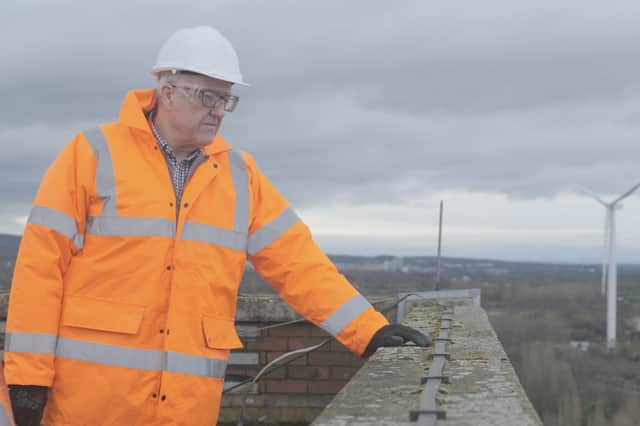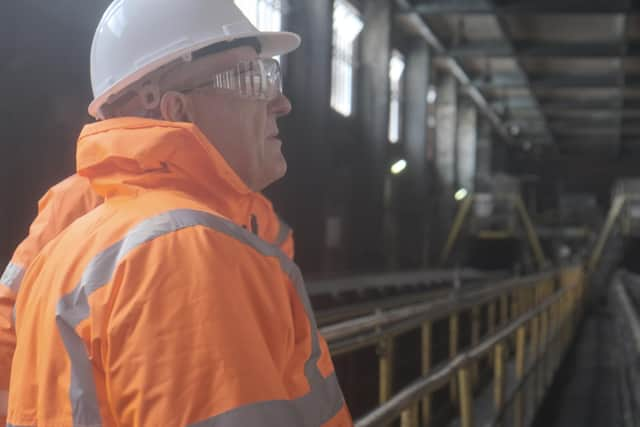The Big Interview: Graham Reid, CEO of Simec Atlantis Energy


The sustainable and renewable energy firm has stakes in projects such as MeyGen, which it says is the world's largest tidal stream power project, in the Pentland Firth, and the Uskmouth Power Station conversion project in Wales.
Mr Reid replaces Tim Cornelius, and said on the news of his new appointment that he was thrilled to be joining SAE at “such an exciting time in its growth trajectory”.
Advertisement
Hide AdAdvertisement
Hide AdYou have just been appointed as the firm's new CEO, can you tell us a bit about your background and what you can bring to the role?


I have a lot of experience in delivering energy and infrastructure projects around the world, with my most recent roles including chief executive of RES Americas and the same role at Arcadis Middle East. My previous positions such as UK managing director and an executive board member of Hyder Consulting plc, and a member of Network Rail’s project delivery board for the London Bridge Station Project, have also helped inform my thinking and approach when it comes to leading significant projects across the energy space.
Having delivered more than five gigawatts of wind, solar and storage projects, I hope to use my experience to support the delivery of SAE’s pioneering pipeline of projects.
What are some of the key projects you will be focusing on over the coming month/years?
At SAE we have three key project areas that we are focused on – these comprise tidal, hydro, and the transition away from coal. Each of these areas is integral to our business, and we have some exciting updates to share:
Tidal: We are currently in the process of transitioning to the next phase of our flagship MeyGen project, delivering the first, at scale, tidal project. The project, which is located in Scotland, continues to break world records and in 2020 exported more than 31 gigawatt hours of electricity to the grid.
Of course, we owe so much of the success of this project to the people of Scotland, to the local community in the north of Scotland, to the local politicians, and national government that have supported and championed what we are doing every step of the way. Their support has delivered a world first but our ambition now is to take that project to the next level. To deliver this we need that support to continue and look forward to finding new ways to work together.
Hydro: We are currently working on the development and building of our hydro business with the leading Green Highlands Team. The Green Highland Renewables team joined SAE in 2019 and specialises in mini-hydro projects in the UK. 2020 saw the team continue to grow its operations and maintenance business, providing 24-hour monitoring as well as reactive and planned maintenance to more than 45 hydroelectric schemes in Scotland.
Advertisement
Hide AdAdvertisement
Hide AdTransitioning away from coal: We have pioneered the first-in-its-kind conversion of our Uskmouth Power Station to take waste-derived fuel pellets. The conversion of Uskmouth will provide the blueprint for other conversion projects across the world. We believe that it is a viable low-carbon energy solution for coal-powered stations destined to be decommissioned.
It will ensure these sites continue to provide a valuable service, compliant with up-to-date emissions regulations and with materially lower levels of carbon dioxide emissions. Local jobs will be secured to support a new sustainable future. The project also helps solve the problem of disposal of the ever-increasing amount of non-recyclable plastic waste that traditionally goes to landfill.
The pandemic is at the forefront of everybody's minds at the moment but the environmental issue has not gone away. What can be done to raise its profile again and accelerate change?
We at SAE want to play our part in helping achieve a net zero world, but the environmental challenges we face as the human race cannot be underestimated. We must be relentless in our fight against global warming or our planet will be decimated. This will require organisations and individuals alike to take steps to reduce their environmental impact by reducing their carbon footprint, adopting more renewable energy resources, and more.
I really value a focus on the environment, and not just carbon. Our project in Wales involves converting a coal-fired power station to take fuel pellets made from waste. This is not only working to reduce the carbon footprint of the power station, but also reduces the amount of waste that normally ends up in landfill.
Finally, with COP26 being hosted here in Scotland this year it presents us with one of our best opportunities to be involved in the climate change debate. We at SAE will make sure we continue to pioneer the projects that will play a key role in driving this agenda.
How will the business need to adapt as Covid restrictions continue?
Despite Covid, the demand for renewable energy projects hasn’t changed – but the way we execute and manage them has. We must look to innovate to ensure we can still develop and operate renewable assets and projects safely.
Advertisement
Hide AdAdvertisement
Hide AdA great example of this innovation was the virtual consultation run by the Uskmouth planning team to ensure we could continue with our planning application while still finding ways to engage with the local community and interested parties.
Another example has been the virtual collaboration that took place between the SAE team in Newport and the Mitsubishi team in Japan during the testing of our first-in-kind fuel pellets. Finally, we can look to our Scottish site in Nigg Energy Park, which has continued to support our MeyGen tidal project and also managed to build and ship our first-ever tidal stream turbine to Japan, all while implementing Covid restrictions and ensuring the full safety of everyone involved.
What will be the number one priority for the business post-lockdown?
Our number one focus will remain the same as before – the delivery of our projects. Lockdowns around the world have forced businesses and individuals to adapt and change. Of course, we at SAE have had to adapt as well, but our priority ahead of the lockdowns was to deliver our projects as they are critical, and this has not changed.
Our tidal project, taking our MeyGen project to the next phase, is key for us and the industry as it will see tidal energy being delivered at scale. Our coal-fired power station project is also a focus for us and for owners and operators of coal-fired power stations around the world to show that there is a lower-carbon alternative.
Finally, the ongoing development of our hydro business is important for both us and the local communities where these projects are so often their lifeblood. We do not just prioritise the delivery of our projects for us at SAE – but for the many teams, organisations, and communities who are involved all the way from inception, to delivery, to the results achieved.
That is why our number one priority both prior to the lockdowns and following them will be to deliver these projects.
What are the main challenges managing such crucial projects?
Advertisement
Hide AdAdvertisement
Hide AdThe main challenge we face is that our projects are the first of their kind, so it is vital that we have a thorough understanding of the risks associated with their delivery, while also being able to provide the assurance and proof of concept needed to demonstrate they are viable.
For our MeyGen tidal project we face two challenges. From an energy perspective, the rewards of harnessing the power of the tide is huge – it is predictable, renewable, and without any visual impact. However, the challenge is the conditions in which the turbine operates. The good news is we have already proved it can work, but the obstacle we must now overcome is how to deliver at scale.
The other challenge is securing the necessary support to unlock further tidal stream projects. This year we should find out whether the UK government will set aside funds in the next Contract for Difference round specifically for tidal. If it does, then we truly believe that MeyGen phase 2 can help create a new industry, and we see ourselves as world-leaders in this space.
How important are the firm's Scottish roots to its future development?
The firm’s Scottish roots are incredibly important to the company’s development. The Scottish government continues to be a global leader in renewable energy and a champion of a net zero economy. Its strong support of the industry enables us to invest and grow our business, maximising jobs and revenues in Scotland – something we look forward to continuing this year.
Are there any particular hurdles or perhaps opportunities brought on by Brexit?
I think this is a wake-up call for the global industry. It is clear that we need to work harder at collaboration and shared learning to ensure we develop new technology that not only helps reduce the levelised cost of energy, but makes tidal energy more affordable and competitive with other renewable technologies.
What are your personal goals for 2021?
Family is very important to me and having travelled so much I am relishing being able to be with them more. I also hope they can be part of my SAE journey, as it is something I am very excited about!
A message from the Editor:
Thank you for reading this article. We're more reliant on your support than ever as the shift in consumer habits brought about by coronavirus impacts our advertisers.
If you haven't already, please consider supporting our trusted, fact-checked journalism by taking out a digital subscription.
Comments
Want to join the conversation? Please or to comment on this article.